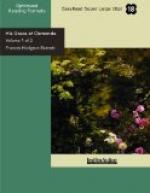Upon the romances of these lives the imagination of the infant Roxholm had nourished itself, and the boy Roxholm being so fed had builded his young life and its ideals upon them.
It was of these ancestors of his house and of their high deeds he found pleasure and profit in talking to his kinsman and friend, and ’twas an incident which took place during one of my Lord Dunstanwolde’s visits to Camylott which led them to this manner of converse.
Roxholm was but eleven years old when in taking a barred gate on a new horse the animal leapt imperfectly and, falling upon his rider, broke a leg and two ribs for him. The injuries were such as all knew must give the boy sharp anguish of body, when he was placed upon a hurdle and carried home. His father galloped to the Tower to break the news to her Grace and prepare her for his coming. My Lord Dunstanwolde walked by the hurdle side, and as he did so, watching the boy closely, he was touched to see that though his beautiful young face was white as death and he lay with closed eyes, he uttered no sound and his lips wore a brave smile.
“Is your pain great, Roxholm?” my Lord asked with tender sympathy.
Roxholm opened his eyes and, still smiling, blushed faintly.
“I think of John Cuthbert de Mertoun,” he said in a low voice. “It aids me to hold the torment at bay.”
He spoke the words with some shyness, as if feeling that one older than himself might smile at the romantic wildness of his fancy. But this my Lord Dunstanwolde did not, understanding him full well, and lying a hand on his pressed it with warm affection. The story of John Cuthbert was, that a hound suddenly going mad one day while he hunted deep in the forest, it had attacked a poor follower and would have torn his throat had his lord not come to his rescue, pulling the beast from him and drawing its fury upon himself, whereby in his battle with it he was horribly bitten; and when the animal lay dead upon the sward he drew his hunting-knife and cut out the mangled flesh with his own hand, “and winced not nor swouned,” as the chronicle recorded with open joy in him.
’Twas while Roxholm lay in bed recovering of his injuries that his kinsman referred to this again, asking him what thoughts he had had of this hero and wherein he had felt them an aid, and the boy’s answers and the talk which followed them had been the beginning of many such conversations, his Lordship finding the young mind full of vigour and fine imagination. Often, as they conversed in after times, the older man was moved by the courageous fancies and strong, high ideals he found himself confronting. ’Twas all so brave and beautiful, and there was such tragedy in the thought that life might hold clouds to dull the gold of it. ’Tis but human that those of maturer years who have known sorrow should be reminded of it by the very faith and joyfulness of youth. One of the fine features of the Tower of Camylott was its Long Gallery, which was of such length and breadth and so finely panelled as to be renowned through all the land. At each end the broad windows looked out upon noble stretches of varying hill and tall and venerable forest, and in wet weather, when the house was full the ladies and gentlemen would promenade there, chatting or sometimes playing games to amuse themselves.




